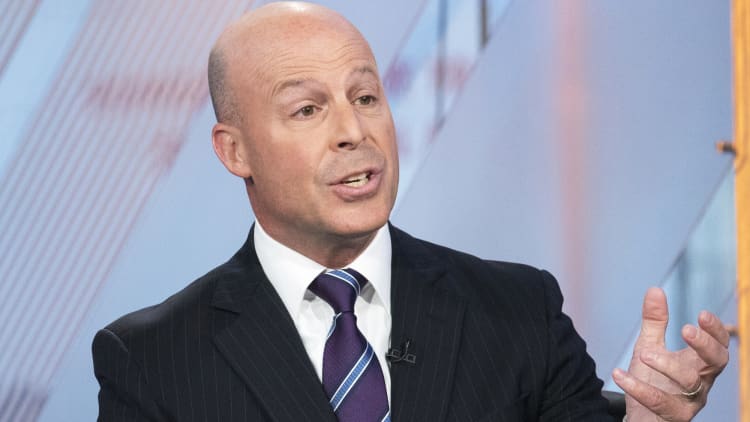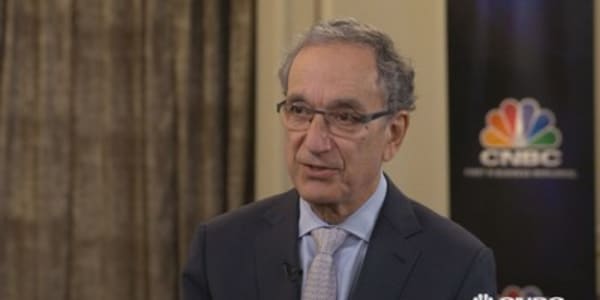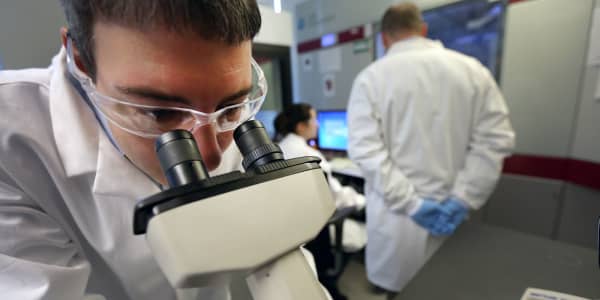
Celgene's acquisition of Impact Biomedicines could be just the start of a flurry of deals in the pharmaceuticals world.
Activity was down in the biopharma sector last year, with only 34 transactions totaling $38 billion, according to JMP Securities, compared with 60 deals worth $133 billion in 2016, and 74 deals worth $174 billion in 2015.
Improving clinical success rates and advancements in science among small and midsize companies will likely attract large companies looking to bolster their innovation pipelines, JMP Securities wrote in a December research note.
Plus, many big companies will have more money to spend. Pharmaceutical companies have some of the largest stockpiles of overseas cash. The tax law President Donald Trump signed last month makes it cheaper for multinational companies to repatriate foreign cash, and they could use that money to fund transactions.
The windfall may not cause companies to completely reverse their corporate strategies, but it could nonetheless make it easier to justify pursuing any mergers or acquisitions. Of course, no one completely knows exactly who will pursue what until it's announced.
The J.P. Morgan Healthcare Conference, which starts Monday, is a hotbed for deals. Here are some companies to keep an eye on.
Johnson & Johnson
The sprawling health-care company dropped $30 billion on its acquisition of Swiss company Actelion last year, so a major deal may not be on the horizon just yet. Still, J&J could use some of the tax law windfall to bulk up its portfolio.
In the third quarter of 2017, Johnson & Johnson held $14 billion overseas, an estimated 90 percent of its total cash, according to Credit Suisse. The company hasn't shared its plan for the money yet, though it expects to do so before it announces earnings on Jan. 23, a company spokesman told CNBC.
J&J has pointed to acquisitions as an important part of its growth strategy.
"I think the most important thing is all of the actions we've taken to invest in the platforms that we believe have significant growth, and we've been doing this both in terms of acquisitions, strategic partnerships and investing in R&D," the company's group worldwide chair, Sandra Peterson, said on an earnings call with analysts in October.
J&J's focus areas for acquisitions are immunology, oncology, cardiovascular and metabolic, infectious diseases and vaccines, and neuroscience, Credit Suisse analyst Vamil Divan wrote in a note published last month. Investing in single assets at earlier stages of development have been the most value creative moves recently, he added.
So J&J may not be hunting for a blockbuster this year, but it could continue scooping up smaller ones.
Pfizer
The drugmaker has said the tax law won't change its approach to capital allocation, which prioritizes dividends, buybacks, investing in the business and M&A.
Just before the tax law passed, Pfizer said it would spend $10 billion on share buybacks and raise its dividend. That leaves deals as a possibility this year.
"Our priorities for capital allocation don't change," Chief Financial Officer Frank D'Amelio said on an earnings call with analysts in October. "They are dividends, share buybacks, investing in the business and M&A. Those will continue to be our capital allocation priorities going forward.
Pfizer has tried and failed to make two $100 billion-plus inversion attempts in the past few years. The deals with AstraZeneca in 2014 and Allergan in 2016 both unraveled, but they show Pfizer's willing to try and execute large transactions.
Pfizer held $13 billion overseas in the third quarter of 2017, representing 90 percent of its total cash, Credit Suisse estimates.
The drugmaker would likely focus on inflammation and immunology, cardiovascular and metabolic, oncology, vaccines, neuroscience and pain, and rare diseases, Credit Suisse said. Investors have focused on Pfizer doing a larger deal, analyst Divan wrote, but the company would rather see midsized deals to bring multiple growth drivers into the innovative business.
Pfizer declined to comment.
Eli Lilly
The Indianapolis-based company has typically favored small deals, but that could change this year under new management.
Eli Lilly's largest acquisition was its $6.5 billion purchase of ImClone in 2008. Multiple new members are joining the executive team this year, and Credit Suisse said it's possible Lilly may look to do something bigger.
Lilly held $11 billion overseas in the third quarter of 2017, or 85 percent of its total cash, Credit Suisse estimates. Lilly's target areas for acquisitions include diabetes, immunology, oncology, neuroscience and pain, Credit Suisse's Divan wrote.
Lilly has not provided specific plans for the repatriated cash, a spokesman said in an email.
"The majority of the repatriated cash will be used to fund our existing capital allocation priorities, including current products and pipeline opportunities, investing in business development, and returning cash to shareholders via the dividend and share buybacks," he said. "A smaller portion of repatriated cash will be used to reduce our debt."
Merck
Merck has said it views deals as ways to boost its pipeline. The tax law could help it pay for a spending spree.
In the third quarter of 2017, $20 billion, or 85 percent, of Merck's cash was overseas, according to Credit Suisse. Divan strongly favors Merck using that money to boost its mid-late stage pipeline and add more growth drivers to the company's story.
Merck CEO Ken Frazier has said the company's looking for transactions that enhance its ability to innovate.
"We're not looking at things purely for synergies or consolidation purposes," Frazier said on an earnings call with analysts in October. "And so I would think that our view continues to be that we're going to look for those things, particularly bolt-ons, that will help us as we go further with our innovation strategy."
When searching for candidates, Merck will likely focus on oncology, vaccines, anti-infectives and acute care, Credit Suisse said.
In a statement to CNBC, Merck praised the tax law.
"This is critical given our innovation model relies on long-term, sustained investment in R&D to discover vaccines and medicines for unmet medical needs," a spokesperson said.
Potential targets
Some companies that Credit Suisse said could be appealing to acquirers are: Galapagos, focused on inflammation and immunology; Portola Pharmaceuticals, a company in the cardiovascular space; Ironwood Pharmaceuticals, who deals with gastrointestinal and metabolic disorders; and Corvus Pharmaceuticals, whose main therapeutic area is oncology.
Novocure is an oncology company that could be a possible target for J&J, according to JMP Securities. Vertex Pharmaceuticals focuses on cystic fibrosis and could attract Pfizer given it has been working with the Cystic Fibrosis Foundation on gene therapy, though it could also be an option for other companies, JMP Securities analysts said.





